
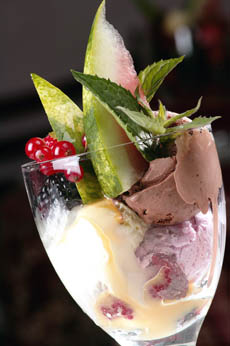 Is it ice cream? Gelato? Frozen yogurt? Learn your ice cream types! Photo by Tomasz Markowski | Dreamstime. Is it ice cream? Gelato? Frozen yogurt? Learn your ice cream types! Photo by Tomasz Markowski | Dreamstime.
July 2005
Last Updated January 2026
|

|
Glossary: Ice Cream Types & Other Frozen Desserts
Terms & Definitions: A ~ F
Is gelato the same as ice cream? Not exactly—it’s all about the air, or lack of it. Is sorbet the same a sorbetto? Yes, one word is French and one is Italian, but sherbet is slightly different—it adds milk. Here’s a guide to one of our favorite topics, ice cream and its close relations. This is Page 1 of a five-page glossary of ice cream types. This page includes terms such as frozen custard, French ice cream, and frozen yogurt. See all of our 100+ food glossaries.
July is National Ice Cream Month.
Click on a letter to go to the appropriate glossary section:
a b c d e f g h i j k l m n o p q r s t u v w x y z
This material is copyrighted and cannot be reproduced in whole or in part
without written permission. You are welcome to link to it.
BAKED ALASKA
A masterpiece of chemistry: ice cream, cake, and meringue baked in the oven until the meringue browns. Ice cream, in a rectangle or mounded in a pie plate, is covered on all sides with slices of sponge cake or pound cake, which is then covered with meringue. The entire dessert is then placed in a 425°F oven just long enough to firm the meringue—three or four minutes. The meringue is an effective insulator, and in the short cooking time needed to finish the dessert, it prevents the ice cream from melting. The concept was developed by the Chinese, who used pastry as the insulator; a Chinese delegation introduced it to Paris in the nineteenth century. The American physicist Benjamin Thompson then investigated the heat resistance of beaten egg whites and, in 1804, demonstrated that beaten egg whites were a better insulator.
|
|
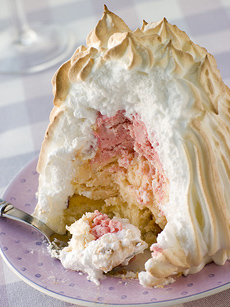
Baked Alaska. Photo by Monkey Business | Dreamstime. |
The dish was named Omelette Surprise or Omelette à la Norvégienne, the Norwegian attribution owing to the “arctic” appearance and cold center. Delmonico’s Restaurant in New York City renamed it Baked Alaska in honor of the newly acquired Alaska territory. Make your own with this Baked Alaska recipe.
National Baked Alaska Day is celebrated on February 1st.
|
BANANA SPLIT
The traditional banana split is a type of ice cream sundae made in a long dish called a boat (hence the alternate term, banana boat). It was invented in 1904 by David Evans Strickler, a 23-year-old apprentice pharmacist at Tassel Pharmacy in Latrobe, Pennsylvania. The sundae originally cost 10 cents, twice the price of other sundaes, and caught on with students of nearby Saint Vincent College. In those pre-digital days, news of the nifty new sundae quickly spread by word of mouth and written correspondence. It must have done well for Strickler: He went on to buy the pharmacy, renaming it Strickler’s Pharmacy. Here’s more about the banana split, including modern versions and how to throw a banana split party.
National Banana Split Day is celebrated on August 25th.
|
|
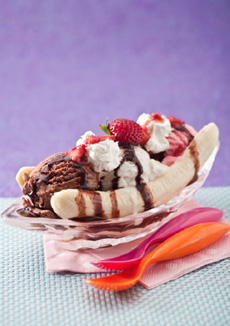
A classic banana split. Photo courtesy Wholesome Junk Food cookbook. |
|
BISCUIT TORTONI or BISQUE
TORTONI or TORTONI
There’s actually a biscuit in a biscuit tortoni, typically crumbled amaretti cookies, but also coconut macaroons, that are mixed into vanilla gelato. The original recipe was a custard frozen to the consistency of ice cream, flavored with rum. The top was dusted with finely chopped almonds. It is not certain if the concept originated with a late 18th-century Neapolitan, Mr. Tortoni, who opened Café Tortoni, one of the first ice cream cafés (glaciers—it operated for nearly 100 years until it closed in 1893), or if it was created elsewhere and named for the popular glacier. In modern recipes, vanilla gelato replaces the custard.
|
|
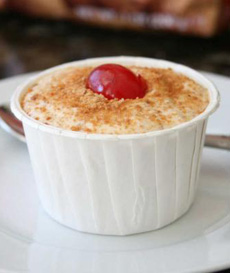
A biscuit tortoni. The biscuits are cookies crumbled inside and/or on top. Photo courtesy Sue Ade. Here’s her family recipe. |
In New York, the dessert, typically made in individual portions in fluted paper cups, was served at posh establishments (it was at the Waldorf Astoria in 1900). The recipe trickled down to neighborhood Italian restaurants. In the U.S., the cookie crumbs often replaced chopped almonds on top, almond extract replaced the rum in the base, and the top was garnished with a maraschino cherry.
|
BOMBE
A combination of frozen parfait and ice cream, in a mold; the mold can be conventional (round, oval) or an unusual shape (flower, lobster). As with a frozen soufflé, fruit can be added, and the mixture can be molded into individual portions or large molds. It is a classic French dessert and an elegant end to a dinner. Ice cream and fruit bombes were very popular in Victorian times; the molds were often lined with cake or biscuits.
|
|
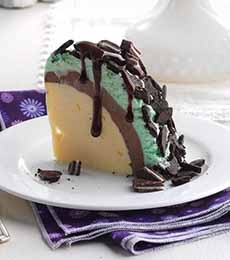
A mint-chocolate bombe. Here’s the recipe from Taste Of Home.
|
|
CABINET
A Rhode Island term for frappe, a New England-style milkshake that does not include ice cream. The term is believed to have derived from the wooden cabinet behind the soda fountain, where either the blender or coffee syrup was stored.
CHURNING
The process of freezing a liquid mixture in an ice cream machine to minimizing crystal formation while incorporating air.
|
|
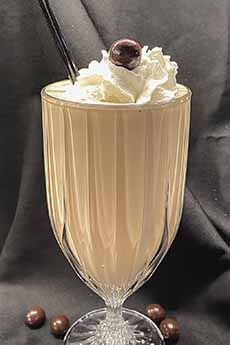 A coffee cabinet. Here’s the recipe (photo © Pattie Tierney | Olla Podrida). A coffee cabinet. Here’s the recipe (photo © Pattie Tierney | Olla Podrida). |
|
CAKE CONE or CUP CONE or
MOLDED CONE
An ice cream cone with a lighter texture, in a mold that creates a “cuff” at the top. It has less flavor than a sugar cone or a waffle cone and is generally served with less expensive ice cream. It is made in both the cup style, with a flat bottom (see photo), and with a classic tapered (pointed) bottom. National Ice Cream Cone Day is celebrated on September 22nd.
CHURNING
The process of freezing a liquid mixture in an ice cream machine to minimize crystal formation while incorporating air.
|
|
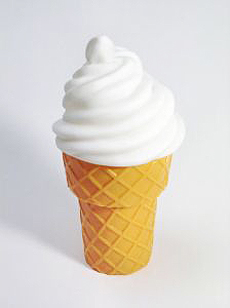 A cake cone filled with frozen custard. Photo by Jeff Prieb | SXC. A cake cone filled with frozen custard. Photo by Jeff Prieb | SXC.
|
|
CONE
A baked conical holder for ice cream. There are three main types: cake cone, sugar cone, and waffle cone.
National Ice Cream Cone Day is celebrated on September 22nd.
|
ESKIMO PIE
The Eskimo Pie was invented in 1920 by Danish immigrant Christian Kent Nelson of Iowa and his partner, Russell Stover, later of boxed chocolates fame. Nelson was inspired by a boy who came to his confectionery shop and could not decide between an ice cream and a chocolate bar, and only had a nickel, which would cover only one of the items. Here’s the full story.
Eskimo Pie was patented on January 24, 1922, but the patent was revoked in 1928 after challenges claimed it was an idea (combining chocolate and ice cream) rather than a sufficiently novel process. Harry Burt’s ice cream bar on a stick (named the Good Humor Bar) received its patent on October 9, 1923.
The revocation of the patent opened the door to others, including Klondike Bar.
Both were chocolate-coated vanilla ice cream. But the Eskimo Pie was wrapped in a silver and blue rectangular box, while Harry Burt’s Good Humor Bar was notably placed on a stick inside a white waxed-paper envelope. (He got the patent for the delivery method, the stick.)
|
|

The old Eskimo Pie branding (above) and the new Edy’s Pie branding (below). Photos via Chat GPT.

|
In 1921, Eskimo Pie, which had been acquired by Dreyer’s Grand Ice Cream, changed its name and branding to be culturally sensitive.
The new branding was named Edy’s Pie in honor of Joseph Edy, co-founder of Dreyer’s Grand Ice Cream (which today is owned by Nestlé).
National Eskimo Pie Day is celebrated on March 28th.

The original Eskimo Pie packaging.
|
|
|
|
FLOAT or ICE CREAM SODA
An ice cream soda, so-called because the carbonation of the soda causes the scoop of ice cream to float on the top of the drink. The float—also known as a soda float—was most likely invented by Robert McCay Green, a soda fountain operator in Philadelphia, in 1874. The occasion was the Franklin Institute’s semicentennial celebration; his fountain was on the grounds. Green reportedly ran out of sweet cream (commonly added to soda at the time) and substituted vanilla ice cream. The fizzy, creamy drink that resulted became wildly popular.
Many variations evolved, including the Root Beer Float a.k.a. Black Cow (root beer and vanilla ice cream), Coke Float (Coca-Cola and ice cream), Boston Cooler (Vernors ginger ale and vanilla ice cream), and Purple Cow (grape soda and ice cream).
|
|
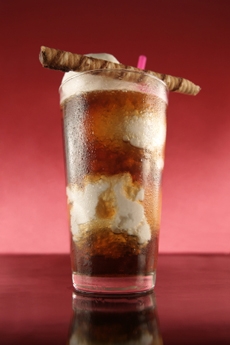
A root beer float, or Black Cow (photo © Shag Photo | iStock Photo). |
A float can also be made with sorbet.
National Ice Cream Soda Day is celebrated on June 20th.
FRAPPE or FRAPPÉ
A New England term for milkshake, from the French frapper, “to beat.” However, it’s a different style of milkshake. In New England, it doesn’t contain ice cream. If you’re from certain parts of Rhode Island and southeastern Massachusetts, you order a cabinet. Why? Because the blender was kept in a cabinet.
What about the accent? Coming from the French, it should be frappé. Why was the accent mark left off? Maybe the area’s menu typesetters didn’t have an aigu, the é with the accent mark. Certainly, with all those colleges in the area, it couldn’t be that nobody knew French.
> Here’s a recipe to make your own. |
|
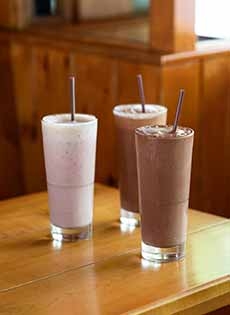
Three flavors of frappe from L.A. Burdick of Boston, who properly spells it frappé. |
FRENCH-STYLE ICE CREAM or FRENCH ICE CREAM
See Frozen Custard, below.
|
FROZEN CUSTARD or FRENCH CUSTARD ICE CREAM
Frozen custard is another term for French ice cream, made with egg yolks, cream, and sugar. These are the same ingredients used to make custard (the pudding-like version), hence the name frozen custard (the different types of custard).
The eggs make French ice cream/frozen custard richer than regular ice cream. The latter is also called Philadelphia-style, New York, or American-style ice cream. See glace.
The term frozen custard can be rightfully confusing, since it evolved in the U.S. to refer to soft-serve ice cream. However, the term “frozen custard” was in use as early as the late 1800s, long before the first soft-serve machine appeared in 1926.
Plus, the U.S. Department of Agriculture standards recognize the term “frozen custard” as “an egg-based ice cream.“
In addition. “It shall also contain for each ninety pounds thereof not less than (a) five dozen of clean wholesome egg yolks, (b) one and five-tenth pounds of wholesome dry egg yolk containing not to exceed seven percent of moisture, (c) three pounds of wholesome frozen egg yolk containing not to exceed fifty-five percent of moisture, or (d) the equivalent of egg yolk in any form.
So why did some retailers begin to sell soft-serve as “frozen custard?”
As large soft-serve chains evolved in the 1950s and 1960s (Carvel, Dairy Queen, Tasty Freez, etc.), someone began calling their soft-serve “frozen custard”—perhaps to make it sound more elegant. And it spread. Alas.
|
|
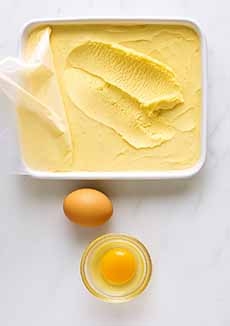
This is vanilla frozen custard, also known as French ice cream and variations of the term. It is yellow compared to regular white vanilla ice cream because of the egg yolks (photo created by ChatGPT 2025-05-13).
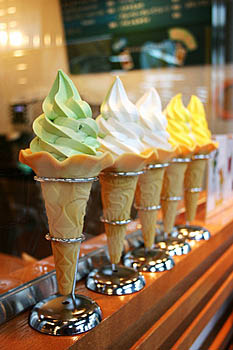
This is NOT frozen custard; it is soft-serve ice cream (photo © Pinkcandy | Dreamstime). |
National Frozen Custard Day is celebrated on August 8th.
FROZEN SOUFFLÉ
A dessert that has a base, usually a cooked custard, that is aerated (lightened) with whipped cream or cooked egg whites and then frozen in a soufflé dish or ramekin with a collar to imitate the “rise” in a baked soufflé. The texture is light, airy, and mousse-like.
It can be made in individual or multi-serving portions.
It is typically softer than a frozen terrine (next entry) and melts quickly on the palate.
|
|
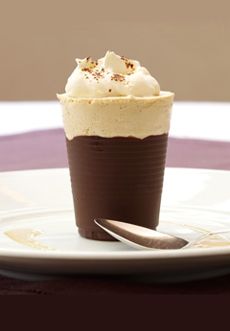
A frozen cappuccino soufflé in a chocolate cup. Get the recipe. Photo courtesy Etoile Restaurant. |
| FROZEN TERRINE
A frozen terrine has a broader range of bases than a frozen soufflé. It can be ice cream, semifreddo, mousse, parfait, or layers of different flavors.
Different layers (flavors) of ice cream and cake can be used, and the terrine can incorporate inclusions such as nuts, fresh or candied fruits, or chocolate.
There are even savory frozen terrines that use luxury ingredients like foie gras or seafood.
It is made in a rectangular or loaf mold (terrine mold) and unmolded, presented, and then sliced. The emphasis is on neat layers or inclusions visible in cross-section to highlight the ingredients.
|
|
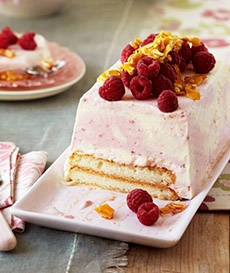
A frozen raspberry terrine. Here’s the recipe (photo © Sainsbury). |
FROZEN YOGURT
A dessert is made of low-fat or nonfat yogurt plus sweetener, gelatin, corn syrup, flavoring, and sometimes coloring. It is churned in an ice cream machine. Frozen yogurt is available in soft-serve and hard-packed forms. It both freezes and melts much more slowly than ice cream, since yogurt has a much higher freezing and melting point than milk. The beneficial bacteria Lactobacillus bulgaricus and Streptococcus thermophilus are believed to be killed when the yogurt is frozen. If you are making frozen yogurt at home, you can use nonfat yogurt and milk in place of regular milk and yogurt in the recipes.
|
|
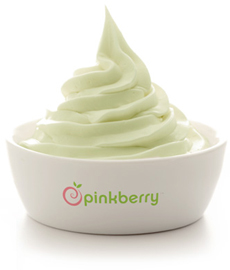
Green tea-flavored frozen yogurt. Photo courtesy Pinkberry. |
Use a high-quality ice cream maker that can successfully freeze the mix over the longer freezing time required. Learn more about yogurt.
June is National Frozen Yogurt Month; February 6th is National Frozen Yogurt Day. Have a DIY frozen yogurt sundae party.
Continue To Next Page: Ice Cream Terms With G
Go To The Article Index Above
Lifestyle Direct, Inc. All rights reserved. Images are the copyright of their respective owners.

|


















